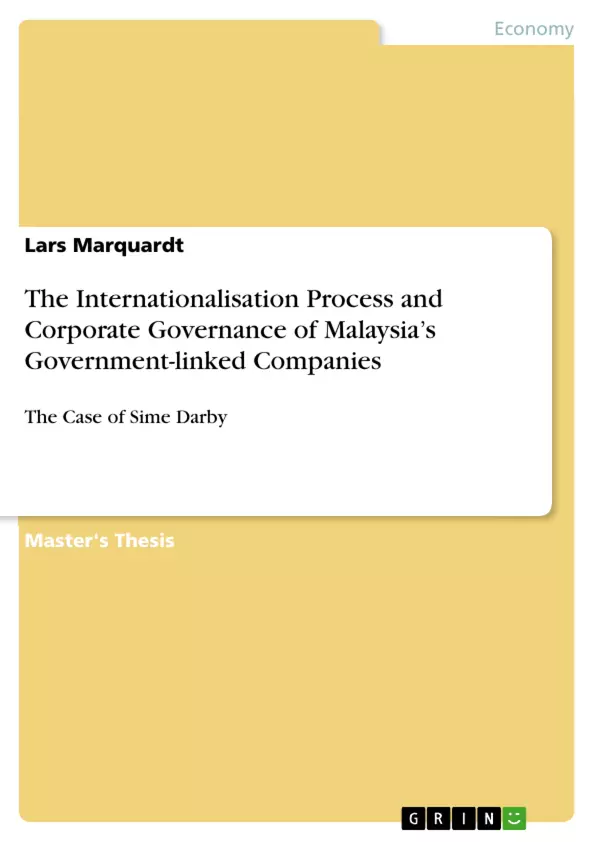The research on the internationalisation process of Southeast Asian multinationals is limited. Especially the unique role of the government on Government-linked companies’ (GLC) corporate governance and their international development has been rarely considered. The agency theory explains an inherent governance problem but needs to be examined from a different angle for GLCs. Theories on internationalisation are based on the Western world, but the patterns are different for developing countries such as Malaysia. The analysis of a firm’s strategy requires to be viewed holistically, embedding it in its economic, cultural and politic context. Utilising a contextual approach and an in-depth case study methodology, this study describes the internationalisation process of Malaysia’s conglomerate Sime Darby and reviews it based on theoretical concepts. Considered individually, accepted theories, as, for instance, the Eclectic Paradigm, were found to be incomplete in explaining the evolving internationalisation of Sime Darby. Combined with thoughts of the Uppsala approach and the phenomenon of psychic distances the theories are complementary. The author detected that together, they can be used to explain the internationalisation process of Malaysia’s GLC. The findings, limitations of research and opportunities for further research are discussed.
Keywords: Internationalisation, Government-linked Companies, Corporate Governance
Inhaltsverzeichnis (Table of Contents)
- Introduction
- State-Owned Enterprises
- An Introduction to State-Owned Enterprises
- Types of SOEs and Motives for Nationalisation
- The Government's Regulatory Impact on GLCs
- Government-linked Companies' Performance
- Corporate Governance
- Introduction to Corporate Governance
- The Agency Theory and a Countervailing Approach
- Corporate Governance and Agency Theory in GLCs
- Khazanah Nasional - A State-Owned Holding
- The Agency Problem of Khazanah
- New Government Regulations in Malaysia
- The Internationalisation Process of Malaysian GLCs
- Internationalisation Theories
- The Eclectic Paradigm
- Investment Development Path
- International Product Life-Cycle Theory
- Uppsala Theory
- The Motives behind the Internationalisation of Malaysian Firms
- The Malaysian Internationalisation Process Do Government Ties constitute a Competitive Advantage?
- Critical Discussion of the Applicability of Theories and the Influence of the Government in Malaysian GLCs
- Combining Internationalisation and the Agency Theory for Malaysian GLCs
- Internationalisation Theories
- Methodology
- Sime Darby - A Case Study
- Company Profile
- Ownership Structure
- Governance and Government Influence
- Sime Darby's Internationalisation Process
- Discussion of Sime Darby's Internationalisation Process in view of the Theoretical Foundations
- Ownership Advantages
- Location Advantages
- Internationalisation Advantages
- Sime Darby's Motives for Internationalisation
- Summarising Thoughts in view of Internationalisation Theories
Zielsetzung und Themenschwerpunkte (Objectives and Key Themes)
This thesis analyzes the internationalization process of Malaysia's government-linked companies (GLCs), specifically focusing on Sime Darby. The research aims to assess the influence of government on GLCs' corporate governance and their international development, applying a contextual approach and an in-depth case study methodology. Key themes explored within the text include: * **The role of government in GLCs' corporate governance and international development:** The research examines how the government's unique role affects both internal and external operations of GLCs. * **The applicability of internationalization theories to Malaysian GLCs:** The study evaluates the validity of existing internationalization theories, particularly the Eclectic Paradigm and Uppsala approach, in the context of Malaysia's unique economic and political landscape. * **The influence of psychic distances on the internationalization process:** The analysis considers the impact of cultural and geographical distances on GLCs' expansion strategies. * **The challenges and opportunities faced by Malaysian GLCs in the global market:** The research explores the specific advantages and disadvantages that government ties present to GLCs operating in the international arena.Zusammenfassung der Kapitel (Chapter Summaries)
* **Introduction:** This chapter establishes the context of the research, outlining the significance of studying the internationalization process of GLCs and highlighting the specific case of Sime Darby. * **State-Owned Enterprises:** This chapter introduces the concept of state-owned enterprises (SOEs), focusing on their varying types, motives for nationalization, and the government's regulatory impact on their performance. * **Corporate Governance:** This chapter delves into the complexities of corporate governance, examining the agency theory and its applicability to GLCs. The chapter also explores the specific case of Khazanah Nasional, a state-owned holding company in Malaysia. * **The Internationalisation Process of Malaysian GLCs:** This chapter reviews existing internationalization theories, including the Eclectic Paradigm, the Investment Development Path, the International Product Life-Cycle Theory, and the Uppsala Theory. It also explores the motives behind the internationalization of Malaysian firms and analyzes the influence of government ties on their competitive advantage. * **Methodology:** This chapter details the research methodology employed, outlining the approach, data sources, and analytical techniques used in the study. * **Sime Darby - A Case Study:** This chapter presents a detailed case study of Sime Darby, examining its company profile, ownership structure, governance, and internationalization process. * **Discussion of Sime Darby's Internationalisation Process in view of the Theoretical Foundations:** This chapter analyzes Sime Darby's internationalization process through the lens of the internationalization theories discussed previously, exploring the company's ownership, location, and internationalization advantages.Schlüsselwörter (Keywords)
This research revolves around the intersection of internationalization, corporate governance, and government-linked companies (GLCs) in the context of Malaysia. The key concepts and themes investigated include internationalization theories such as the Eclectic Paradigm and Uppsala approach, the role of government influence on corporate governance and international expansion, the impact of psychic distances, and the specific case study of Sime Darby.- Quote paper
- Lars Marquardt (Author), 2013, The Internationalisation Process and Corporate Governance of Malaysia’s Government-linked Companies, Munich, GRIN Verlag, https://www.grin.com/document/262772



